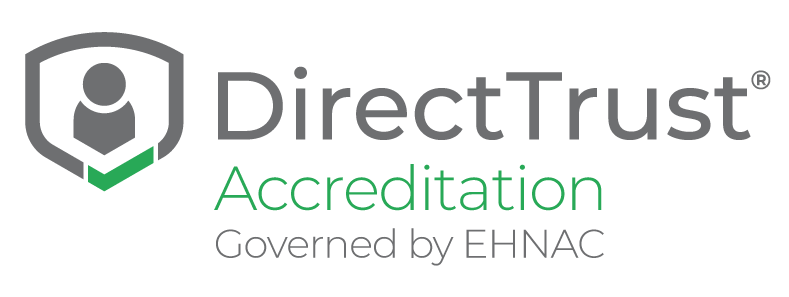Accreditation and EHNAC
The Electronic Healthcare Network Accreditation Commission (EHNAC) was created in 1995 as an independent, federally recognized, standards development organization and tax-exempt, 501(c)(6) non-profit accrediting body designed to improve transactional quality, operational efficiency and data security in healthcare. It is now the governing body of DirectTrust Accreditation.
About DirectTrust Accreditation
DirectTrust offers a variety of accreditation programs for many types of healthcare stakeholders. Accreditation is vital in healthcare to ensure the security, compliance, and quality of data exchange processes. It builds trust among stakeholders, promotes operational excellence, and safeguards patient information, ultimately contributing to improved healthcare outcomes and reduced risks in an increasingly complex healthcare landscape.
Additionally, accreditation offers the for the following reasons and benefits:
- Ensuring Data Security: Accreditation validates that an organization meets rigorous standards for data security and privacy. This is critical in an era of increasing data breaches and cyber threats, where safeguarding sensitive patient information is paramount.
- Compliance with Regulations: Accreditation helps healthcare organizations demonstrate compliance with regulatory requirements, such as HIPAA and HITECH Act. This not only reduces legal and regulatory risks but also ensures adherence to industry standards.
- Quality Assurance: Accreditation signifies a commitment to high-quality healthcare data exchange practices. It helps improve the overall quality of healthcare services and contributes to better patient outcomes.
- Interoperability: Relevant DirectTrust accreditation programs include requirements related to interoperability, ensuring that healthcare organizations can effectively exchange data with other entities. This supports care coordination and enhances patient care.
- Patient Trust: Healthcare organizations that are accredited are more likely to gain trust from patients, providers, and partners. Accreditation serves as a mark of confidence that an organization follows best practices in data handling and security.
- Process Improvement: Pursuing accreditation often leads to a review of internal processes and practices, driving process improvements and increased operational efficiency within healthcare entities.
- Competitive Advantage: Accreditation provides a competitive edge in the healthcare industry. Accredited organizations can use this distinction to attract customers and partners, differentiating themselves from competitors.
- Cost Savings: By identifying and mitigating risks through the accreditation process, healthcare organizations can avoid costly errors, data breaches, and regulatory fines, resulting in long-term cost savings.
EHNAC’s History of Accreditation
The Electronic Healthcare Network Accreditation Commission (EHNAC) grew out of the 1993 Workgroup for Electronic Data Interchange (WEDI), sponsored by the Network Architecture and Accreditation Technical Advisory Group. The healthcare transactions industry agreed there was a need for a self-governing body to develop standards for the industry, and the Association for Electronic Health Care Transactions (AFEHCT) championed the cause by sponsoring an Accreditation Workgroup.
More than thirty representatives from all facets of the healthcare transactions industry participated in a series of meetings and surveys to develop the first industry standards for data transmission, data security, advertising and resource capability. Funded by a loan from AFEHCT, the independent, self-governing EHNAC was born and began accrediting electronic health networks in 1995. Learn more about EHNAC’s leadership.
In 2023, EHNAC merged with and into DirectTrust, the non-profit, vendor-neutral alliance dedicated to instilling trust in the exchange of health data. EHNAC now serves as the accreditation and certification body for the organization.
Advancing Healthcare Through Stakeholder-Defined Accreditation
DirectTrust’s accreditation and certification programs represent a diverse cross-section of healthcare stakeholders. Electronic health networks, payers, hospitals, physicians, consumer groups, financial services firms, state regulators, security organizations and vendors are all working together to establish sound criteria for third-party review and accreditation.
